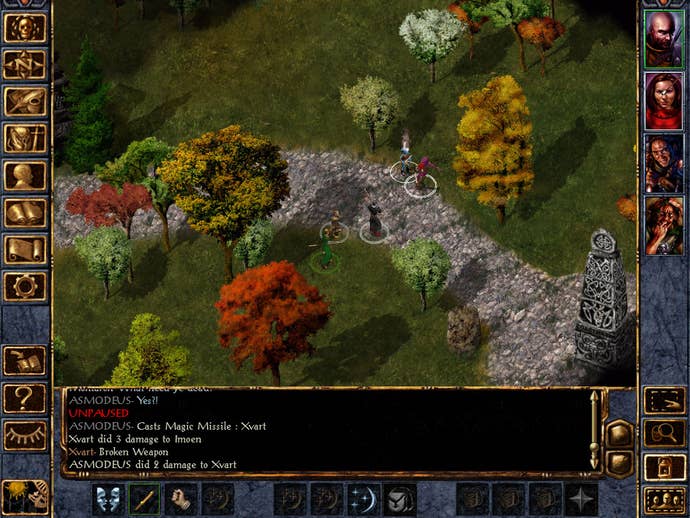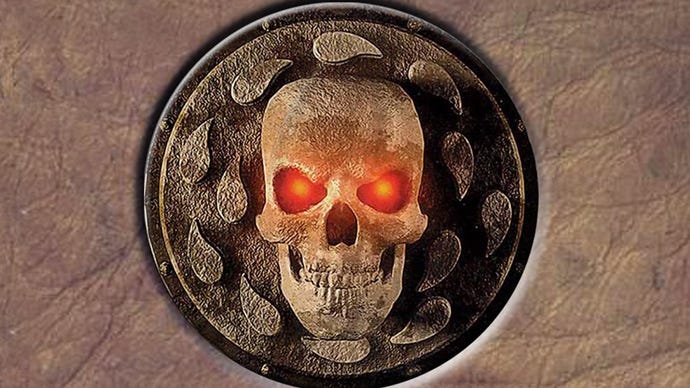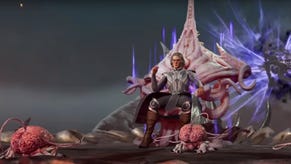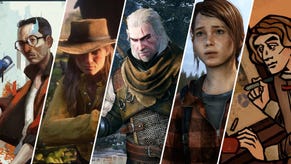Larian Studios Shares Its Vision for Baldur's Gate 3: "We Got the Keys to the Toy Box"
We talk to Larian founder Swen Vincke and D&D creative director Mike Mearls about reviving one of the greatest RPGs ever.
This article first appeared on USgamer, a partner publication of VG247. Some content, such as this article, has been migrated to VG247 for posterity after USgamer's closure - but it has not been edited or further vetted by the VG247 team.
Baldur's Gate is officially back. Larian Studios took the wraps off the anticipated sequel during today's Google Stadia reveal, showing a brief teaser featuring a grotesque Mind flayer transformation while confirming that it would be coming to both PC and Stadia.
Set 100 years after the events of the original games, Baldur's Gate 3 will utilize Dungeons and Dragons' 5th Edition Rules. But that doesn't mean that Baldur's Gate 3 will be an isometric RPG like BioWare's old Infinity Engine games. Rather, it will have its own identity, Larian founder Swen Vincke tells USG. "We're going to have some things that you haven't seen yet in CRPGs, which I would love to talk about, but I'm going to hold it," Vincke says.
At this point, Larian isn't really ready to reveal much about Baldur's Gate 3. With the release date still fairly distant, Vincke says that it mostly revealed Baldur's Gate because the team wanted to start a dialogue with fans. Still, there's enough that I was able to get Vincke and Dungeon's & Dragons franchise creative director Mike Mearls to talk for about 40 minutes. Here's what they had to say.
Baldur's Gate 3 will put a big emphasis on player choice while relying on a streamlined ruleset
As mentioned above, it's unclear at this point what form Baldur's Gate 3 will ultimately take. Will it still be a turn-based RPG? Or will it be more action-based? Knowing Larian's track record, which skews toward hardcore PC RPGs like Divinity: Original Sin, it may well be the former. Larian isn't saying one way or another though.
One thing Vincke will talk about is player choice. When I ask him what element of Baldur's Gate he thinks is most important to capture, he says, "'What do you do?' It's that question and option to do whatever you want. If we can get that agency and freedom of systems and make your own adventure in that way, then we've accomplished what we set out to do."
Vincke also confirms that Baldur's Gate 3 will emphasize environmental interaction of some sort, though it's unclear what form it will ultimately take. When I ask Vincke if Baldur's Gate 2 will have interactions similar to that of Divinity: Original Sin 2, where you could set up massive combos by, say, arcing lightning across water, he says, "And more."
"Tabletop gaming gives you all these systems, then it's the imagination. The player uses the system to do something, then the DM decides whether they want to go with it, and makes sure the world reacts to it. That's essentially what the game has to be. When you're in combat, it'll be about more than just clicking which spell or ability you want to start using. You will have more possibilities, and we're trying to go very broad," Vincke says.
The 5th Edition rules upon which Baldur's Gate 3 is based are purposely streamlined in comparison to their predecessors. Vincke talks about being able to explain them in less than 10 minutes to total newcomers, which he says he wasn't able to do with 2nd Edition or 3.5. It's part of D&D's attempt to woo new and lapsed players to the series.
Mearls characterizes Baldur's Gate 3 as "part of the evolution of D&D [...] a very natural step. "This is a chance to get people who maybe don't have an interest in tabletop roleplaying, who are looking for something that's more just pure story. They don't necessarily want to immerse themselves in the rules. They can have a great experience that's very authentically D&D in terms of the puzzle solving and the storytelling without necessarily having to make the commitment of playing a tabletop game," he explains.
All of this makes me think Baldur's Gate 3 will be more geared toward the mainstream than previous Larian efforts. Still, don't expect an open-world action RPG like The Witcher. Vincke is something of a purist when it comes to CRPGs, and that's reflected in games like Divinity: Original Sin 2, which remains defiantly turn-based. That's not to say that Larian is behind the times. In fact, it's often very ambitious, striving to push the boundaries of online multiplayer and turn-based combat. It just has a very defined personality.
Based on the fact that Baldur's Gate 3 will retain online multiplayer, I expect it to still be a party-based RPG of some sort. And as a very systems-focused developer, I fully expect some interesting combat. But otherwise Larian is being very coy about Baldur's Gate 3's gameplay, and it makes me wonder just what it has in store.
Why Baldur's Gate 3 is on Google Stadia: "Playing it anywhere just by sharing a link is very powerful"
One question that was on my mind: Why is Baldur's Gate 3 on Google Stadia? Is Larian genuinely excited about our supposed cloud-based future? Is Google helping out with development?
Vincke denied the latter, but he says he's intrigued by the ability to instantly download and play games. "If you have the ability to stream [Baldur's Gate 3], that means you have the ability to play with a larger group of people very easily, which is a good thing. But there's more. There's a lot of people who watch Critical Role [a D&D web series], and since BG3 has drop-in/drop out multiplayer, you can suddenly start having the community working together with streamers."
Vincke says that it was Larian that originally sought out Google Stadia. As he tells it, he realized "Google was up to something" at last year's E3, and subsequently used his contacts to get in touch. Discussions progressed from there, he says.

Vincke recounts a long discussion he had with a Google Stadia representative at Larian's office. "It turned out that several of the features they offered were already on the roadmap because people had been asking for them," he says. "It made it a very natural fit, and hence it was with a lot of enthusiasm that we embraced the platform."
Vincke says that working on Stadia is a lot like working on PC. He notes the centralized server, which he says makes it possible for players to instantly share with each other. Vincke is also excited by the possibilities afforded by physics-based synchronization, which he calls a "very big thing."
"In the past that was a big problem that we had, because we couldn't just send our entire physics simulation and have it synched. It didn't work," Vincke says. "Now it can work. You can have lots of gameplay."
Baldur's Gate 3 will be "starting clean"
Baldur's Gate, of course, is a series with a tremendous amount of history behind it. First developed by BioWare, it is frequently on the shortlist of the best RPGs of all time. In Axe of the Blood God's Top 25 RPG of All Time Series, I put Baldur's Gate 2 in the top 10.
Despite that, Larian very much has its own vision for the series. It will have callbacks of course ("Expect iconic things to be present," Vincke says), and it will be steeped in D&D lore, but setting it 100 years after the events of the original seems to be Larian's way of decoupling it from BioWare's work. I ask if Larian is making use of any work from Black Hound, which had been under development at Black Isle Studios before it closed in the early 2000s, and he says no.
"We started clean. I didn't look at Black Hound. We just started with what we knew with Baldur's Gate, and went with what we thought was a very cool and surprising idea. We had the core of the idea from one of the books and asked if we could do it and they said yeah," Vincke says.
As for whether Larian has had any input from the original games, Vincke hints that he has had conversations with folks from BioWare, but won't say with whom. None of the original developers are on the actual team.

In terms of the story Larian has in mind, it's clear that Mind flayers will have a big part to play in Baldur's Gate 3. Asked why Larian is focusing on the Cthulhu-like brain eaters, Vincke says dryly, "They're Mind flayers, they're cool. They also have an element of Spelljammer to them [a 2nd edition campaign setting], which is a personal weakness."
Vincke goes on. "They have a very interesting history. They used to have a big empire before they were destroyed. Now they're in hiding, they're in the Underdark. All of the Mindflayers are after the grand design: how to restore their empire. So you have a very nice storyline there; very easy to understand background for creatures who have a good motivation to do things. But then when you start fooling around with it, there's a lot of things you can start doing with them."
On the subject of the very brief teaser trailer, he says, "We're not saying where the [scene you see] happens. This trailer is not the opening."
Larian will once again be using its own engine for the project, but with some significant upgrades, which are intended to be reflected in the teaser trailer. Vincke says Larian started building the Baldur's Gate 3 pipeline back in 2017, when Divinity: Original Sin 2 was still under development, and is now reaping the benefits.
"I don't think Baldur's Gate 3 will have to blush when it comes to production values, which is very much the idea behind the trailer. This is new for us. We moved tremendously from Divinity: Original Sin to Divinity: Original Sin 2. There is a similar type of jump to Baldur's Gate 3," Vincke says.
Baldur's Gate 3 is an interesting move for Larian on the whole since this marks its first attempt at a licensed game. Any creator will tell you that when multiple stakeholders get involved, the process is naturally very different. But Vincke says that Larian has effectively been given "the keys to the toy box" when it comes to developing Baldur's Gate 3. "It doesn't feel like we're working on a licensed game. It feels like we're working on the thing that we want to make."
Mearls adds, "It's important for us to partner with people and give them the keys so they can do what they need to do."
One takeaway from all this: Larian is a big deal now. It has grown massively since the original Divinity: Original Sin, boasting four worldwide studios and some 200 employees, with another 100 external developers helping to build Baldur's Gate 3. Major RPG properties like Dungeons & Dragons want to work with the studio that made one of the best RPGs of the generation.
But for Larian, Baldur's Gate is just another step down the road toward what Vincke really wants: making the ultimate RPG. "We have a 'very big RPG to dwarf them all' plan. There are a bunch of things that we need to grow. This is part of that," he says.
In the shorter term, Larian still has a lot of work to do on Baldur's Gate 3. When I ask if it might come out in 2019, Vincke only laughs and says no. It sounds like we won't be getting the final game until late 2020, or even early 2021, though this is just speculation on my part. But for now, the best eager fans are going to get is the new Baldur's Gate: Descent Into Avernus tabletop, which is described as a prequel to Baldur's Gate 3.
We'll have more information soon, hopefully. But for now, RPG fans have plenty of reasons to celebrate. After close to 20 years, one of the most beloved CRPG franchises of all time is finally getting the sequel it deserves.










